- Home
- Francine Rivers
The Priest: Aaron Page 10
The Priest: Aaron Read online
Page 10
“You were called to deliver Israel, too, my brother.” They went out into the open to wait.
The air changed. Lightning flashed and was followed by a low, heavy roll of sound. People peered out of their tents, tentative, frightened. Aaron called out to them. “Come! It is time.” Miriam, his sons, and their wives and children came outside, washed and ready. Smiling, Aaron followed Moses and beckoned the people to follow.
Smoke billowed as from a giant furnace. The whole mountain shook, making the ground beneath Aaron’s feet shake. His heart trembled. The air grew dense. Aaron’s blood raced as his skin prickled with sensation. The cloud overhead swirled like great waves of dark gray moving around the mountaintop. A spear of light flashed and was answered by a deep roar Aaron could feel inside his chest. Another spear of light flashed and another, the sound so deep it rolled over and through him. From within the cloud came the sound of the ram’s horn—long, loud, recognizable and yet alien. Aaron wanted to cover his ears and hide from the power of it, but stood straight, praying. Have mercy on me. Have mercy on me. All the great winds of the earth were coming through the shofar, for the Creator of all was blowing it.
Moses walked toward the mountain. Aaron stayed close to him, as eager as he was terrified. He couldn’t take his eyes from the swelling smoke, the streaks of fire, the brilliance amidst the gray churning cloud. The Lord was coming! Aaron saw the red, orange, and gold flickering light descending, smoke billowing up from the mountain. The Lord is a consuming fire! The ground shook beneath Aaron’s feet. There was no hint of ash in the air despite the fire and smoke from the mountaintop.
The deep blast of the shofar continued until Aaron’s heart ached with the sound. He stopped when he came to the boundary God had set and watched as Moses went up the mountain alone to meet with the Lord face-to-face. Aaron waited, breath shallow, arms outstretched so that the people would know to stay back. The mountain was holy ground. When he looked over his shoulder, he saw Joshua and Miriam, Eleazar and little Phinehas, and others. They all stood looking up, faces rapt with awe.
And then Aaron heard the Lord again.
I am the Lord your God, who rescued you from slavery in Egypt.
The Word of the Lord rushed in, through, and out of Aaron.
Do not worship any other gods besides Me. Do not make idols of any kind, whether in the shape of birds or animals or fish. . . . Do not misuse the name of the Lord your God. . . . Remember to observe the Sabbath day by keeping it holy. . . . Honor your father and mother. Then you will live a long, full life in the land the Lord your God will give you. . . . Do not murder. . . . Do not commit adultery. . . . Do not steal. . . . Do not testify falsely against your neighbor. . . . Do not covet your neighbor’s house. Do not covet your neighbor’s wife, male or female servant, ox or donkey, or anything else your neighbor owns.
The Voice overshadowed and shone through, and drew up from the depths inside him and spilled out with unbridled joy. Aaron’s heart sang even as the fear of the Lord filled him. His blood raced like a cleansing stream washing away everything in a flood of sensation. He felt the old life ebb and true life rush in. The Word of the Lord was there inside him, stirring, swelling, blazing bright in his mind, burning in his heart, pouring from his mouth. Pure ecstasy filled him as he felt the Presence, the Voice within, heard without, all around him. Amen! And amen! Let it be! Let it be! He wanted to stay immersed. Reign in me, Lord. Reign! Reign!
But the people were screaming, “Moses! Moses!”
Aaron didn’t want to turn away from what he was experiencing. He wanted to scream back at them not to refuse the gift offered! Embrace it. Embrace Him. Don’t bring an end to the relationship we were born to have. But it was already too late.
Moses came back. “Don’t be afraid, for God has come in this way to show you His awesome power. From now on, let your fear of Him keep you from sinning!”
The people ran. “Come back!” Aaron called, but they had already fled in terror and remained at a distance. Even his own sons and their children! Tears of disappointment burned his eyes. What choice had he now but to go to them?
“You tell us what God says, Moses, and we will listen,” the leaders called out. “But don’t let God speak directly to us. If He does, we will die!”
“Come and hear for yourself what the Lord says to you.”
They cowered from the sound and wind. They would not raise their heads and look up at the smoke and fire.
The thunder ceased and the wind died down. The shofar no longer sounded from the mountaintop. The earth grew still.
Aaron was in anguish over the silence. The moment was over, the opportunity lost forever. Did these people fail to understand what had been offered, what they had rejected? His throat was tight and hot as he held in his grief and disappointment.
Will I ever hear His voice again? Miriam said something to him, then to his sons. Aaron could not speak for the choking sorrow holding him where he was. He kept looking up at the glow of glory on Sinai. He had felt that fire burning within him, igniting his life with what it would mean to be like Moses. Oh, to hear the Lord daily, to have a personal relationship with God, the Creator of all things. And if all had heard, the heavy burden of responsibility for this multitude would be lifted from his back and from Moses’. Each person would have heard God’s voice. Each person would know God’s Word. Each would be made to understand and could then choose to obey the will of God.
The dream of it gripped him. Freedom from the responsibility of so many lives. And the people! No more complaining! No more grumbling! Every man in Israel would be equally yoked!
But the dream was already slipping away and the weight of God’s call was on him again. Aaron remembered the days of his youth when he had no one to worry about but himself, no responsibility but to survive the slave masters and the Egyptian sun.
The fire on Sinai was a red-gold haze through his tears. Oh, Lord, Lord, how I long to . . . to what? He had no words, no explanation for what he felt. Just this pain at the center of his being, the ache of loss and longing. And he knew it would never really go away. God had called them to the mountain to hear His voice. God had called them to be His people. But they had rejected the proffered gift and cried out instead for a man to lead them: Moses.
“Do not be downcast, Aaron.” Miriam sat with him and put her hand on his head. “We could not help but be afraid. Such sound. Such fury.”
Did she think he was a little boy to be comforted? He stood and moved away from her. “He is the Lord! You have seen the cloud and the pillar of fire. My own family fled like frightened sheep!” His sons and their wives and children had cried out for Moses like the rest. Did his words to them mean nothing? Was he still a slave? All these months he had tried to tell them what it was like to hear the voice of the Lord, to know it was God speaking and not some voice in his own imaginings. And when their chance came, what did they do? They ran from God. They shook inside their newly washed robes. They wept in terror and cried out for Moses to listen to God’s voice and speak the Word to them.
“You’re acting like a child, Aaron.”
He turned on his sister. “You’re not my mother, Miriam. Nor my wife.”
Blushing, she opened her mouth to retort, but he walked past her out of the tent. There was no silencing her. She was like the wind, ever blowing, and he was in no mood to listen to her counsel, or her complaining.
Moses approached. “Gather the people and have them assemble at the foot of the mountain.”
They all came, Aaron leading them. Joshua was already at the foot of the mountain, standing beside Moses. Aaron was annoyed that Eliezer and Gershom were not there to serve their father. Why should it be this young man of the tribe of Ephraim who stood near Moses rather than one of their own relations? From the beginning of the journey out of Egypt, Joshua had stationed himself as near Moses as possible, serving him with every opportunity given. And Moses had embraced the young man as his servant. Even when Jethro had brought Eliezer an
d Gershom with Zipporah, Joshua remained at Moses’ side. Where were Moses’ sons this morning? Aaron spotted them among the people, standing on either side of their ailing mother.
“Hear the Word of the Lord!” The throng fell silent and listened as Moses told them all the words the Lord had given him, laws to keep the people from sinning against one another, laws to protect foreigners who lived among them and followed the way of the Lord, laws concerning property when it would be given to them, laws of justice and mercy. The Lord proclaimed three festivals to be celebrated each year: the Festival of Unleavened Bread to remind them of their deliverance from Egypt, the Festival of Harvest, and the Festival of the Final Harvest to give thanks for the Lord’s provision. Wherever they lived in the Promised Land, all the men of Israel were to appear before the Lord at a place the Lord set during these three celebrations.
No longer would they be able to do whatever was right in their own eyes.
“The Lord is sending His angel before us to lead us safely to the land He has prepared for us. We must pay attention to Him, and obey all of His instructions. Do not rebel against Him, for He will not forgive your sins. He is the Lord’s representative—He bears His name.”
Aaron’s heart raced as he remembered the Man he had seen walking in front of his brother. He had not been a figment of his imagination! Nor was the Man who had stood within the rock at Mount Sinai and from whom the water had flowed. They were one and the same, the Angel of the Lord. Leaning in, he drank in his brother’s words.
“If you are careful to obey Him, following all of the Lord’s instructions, then He will be an enemy to our enemies, and He will oppose those who oppose us.” Moses spread his arms, palms up. “We must serve only the Lord our God. If we do, He will bless us with food and water, and He will keep us healthy. There will be no miscarriages or infertility among our people, and He will give us long, full lives. When we get to the Promised Land, we must drive out the people who live there or they will cause us to sin against the Lord because their gods are a snare.” He lowered his hands. “And what do you say to the Lord?”
Aaron called out, “Everything the Lord says, we will do!” And the people repeated his words until over a million voices rang out before the Lord God of Israel.
Early the next morning, Moses built an altar of earth before the mountain of God. Twelve uncut stone pillars stood, one for each of the tribes of Israel. Young Israelite men were chosen to bring forward sacrificed young bulls as fellowship offerings to the Lord. Moses took half the blood of the bulls and put it into bowls. The other half he sprinkled on the altar. He read the Word of the Lord that he had written into the Book of the Covenant, and the people said again that they would obey the Word of the Lord. The air was filled with the scent of burnt offerings.
Moses turned to him. “Aaron, you and your two sons, Nadab and Abihu, and the seventy leaders are to come with me up the mountain.” Aaron savored the command. He had waited for this moment, a time when he would not only hear the Word of the Lord, but stand in His presence. Joy mingled with fear as he followed his brother up Mount Sinai, the elders behind him.
The climb was not easy. Surely, it was the Lord Himself who had given Moses the strength to make this climb four times before! Aaron felt every day of his eighty-three years as he followed in his brother’s footsteps, weaving his way upward along the rough path. His muscles ached. He had to pause for breath and start again. Above was the swirling cloud of the Lord, the fire on the mountaintop. When Aaron, his sons, and the elders reached a level space, Moses stood waiting. “We will worship the Lord here.”
Aaron saw the God of Israel. Under His feet there seemed to be a pavement of brilliant sapphire, as clear as the heavens. Surely now, Aaron would die. He trembled at the sight before him and fell on his knees, bowing his head to the ground.
Arise and eat. Drink the water I give you.
Never before had Aaron felt such exultation and thanksgiving. He never wanted to leave this place. He forgot all those around him and those who waited on the plains below. He lived in the moment, filled up and fulfilled with the sight of God’s power and majesty. He felt small but not insignificant, one among many, but cherished. The manna tasted of heaven; the water restored his strength.
Moses put his hand on Aaron’s shoulder. “The Lord has called me up the mountain to give me the Law for His people. Stay here and wait for us until we come back.”
“We?”
“Joshua is going up the mountain with me.”
Aaron felt a cold wave of anger. He looked past Moses to the younger man. “He is an Ephraimite, not a Levite.”
“Aaron.” Moses spoke quietly. “Are we not to obey the Lord in all things?”
His stomach clenched tight. His mouth trembled. “Yes.” I want to go, he longed to say. I want be the one at your side! Why do you set me aside now?
All the feelings he had as a lonely boy sitting in the reeds came rushing back. Someone else was being chosen.
Moses spoke to them all. “If there are any problems while I am gone, consult with Aaron and Hur, who are here with you.”
Bereft, Aaron watched Moses turn away and take the high path farther up the mountain, Joshua close behind. Tears burned in Aaron’s eyes. He blinked them away, fighting against the emotions warring inside him. Why Joshua? Why not me? Hadn’t he been the one to find Moses in the desert? Hadn’t he been the one God had chosen as Moses’ spokesman? Aaron’s throat closed, hot, tight, choking him. It’s not fair!
As Moses and Joshua ascended, Aaron remained with the others, and the weight of people was heavier now than it had ever been before.
For six days, Aaron and the others remained on the mountain, the cloud shrouding its top, Moses and Joshua within sight, but separated from them. And then on the seventh day, the Lord called to Moses from within the cloud. Aaron and the others heard the Voice, like low, rolling thunder. Moses rose and continued up the mountain, Joshua following for a ways and then remaining like a sentry on guard as Aaron’s brother entered the cloud. A rush of sound came, and a blaze of fire flashed brilliant from the mountain peak. From below, they could hear people screaming.
“Aaron!” Hur cried out. “The people need us to reassure them.”
Aaron kept his back to the others. “Moses said to wait here.”
“The elders are going down.”
“We were to wait!”
“Aaron!” Hur called out. “They need you!”
Aaron wept bitterly. Why? God, why must I be left behind?
“Moses said they were to come to us for counsel. If they cross the boundaries, the Lord will strike out against them!”
Aaron shut his eyes tightly. “All right!” His shoulders sagged as he turned away. He started back down the mountain pathway, fully intending to do what the Lord required of him.
Glancing back one last time, Aaron looked up. Joshua stood in the haze at the edge of the cloud that shrouded the mountain.
The elders surrounded Aaron, frightened, confused. “It’s been ten days, Aaron! And the fire has burned constantly.”
“The people believe Moses is dead.”
“Would the Lord God kill His anointed?” Aaron said, angry.
“No man could live in the midst of that fire!”
“Nor has Joshua returned.”
“Someone should go up and see if—”
Aaron rose, glaring at his sons. “No one is to go near the mountain! Have you forgotten the boundaries God set? It is holy ground! Any who come near will be struck dead by the Lord!”
“Then surely Moses and Joshua are dead already.”
“My brother is alive! The Lord Himself called him to the top of the mountain to receive the Word. He will come back to us!”
Korah shook his head. “You are a dreamer, Aaron! Look up! What man can survive such a fire?”
“That fire will consume you if you rebel against the Lord!”
They all spoke at once.
Aaron shouted, “Go back to you
r tents. Gather the manna each morning as you have been instructed. Drink the water the Lord has supplied. And wait as I wait!” He went back inside his tent and yanked the flap closed. He sat on a cushion and covered his face. He didn’t want to listen to their doubts. He had enough doubts of his own. Moses said, “wait.” I have to wait. God, help me wait!
He thought of Joshua standing up there beside Moses. Joshua, the one his brother had chosen . . .
“Don’t you think you should . . .”
He glared at his sister.
She sighed loudly. “I was just thinking . . .” She held his gaze for a moment and then lowered her head and went back to carding wool.
Even Aaron’s sons plagued him with questions. “I don’t know why he remains so long on the mountain! I don’t know if he is well! Yes! He is an old man, and I am older still. If you keep on besieging me, you will wear me down to the grave with your demands!”
Only after a long, exhausting day of counseling and judging did Aaron stand alone. While the people slept, he looked up at the mountain and watched the consuming fire. How had Moses born such pressure? How had he listened to case after case and kept himself clear of sides?
I can’t do this, Moses. You’ve got to come down off that mountain. You’ve got to come back!
Was Moses dead? He shut his eyes tightly at the thought, fear welling up inside him. Was that why there was no sign of him after so many days? And where was Joshua? Was he still waiting on that rocky slope? His provisions must be gone by now.
The people were like sheep without a shepherd. Their questions had become like bleats and baaas. Aaron knew he was going to have to do something to keep the people from wandering off. Some wanted to go back to Egypt. Others wanted to take their flocks to Midian pastures. No one was content.
He couldn’t sleep. He gathered the manna with everyone else, but could barely eat. Everywhere he went, he was met with the same questions:
“Where is Moses?” On the mountain with God.
“Is he alive?” I am certain he is.

 An Echo in the Darkness
An Echo in the Darkness A Lineage of Grace
A Lineage of Grace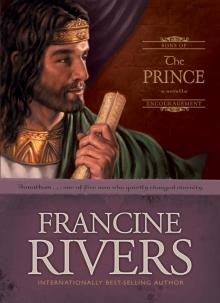 The Prince: Jonathan
The Prince: Jonathan Bridge to Haven
Bridge to Haven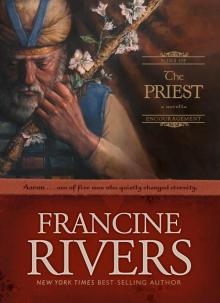 The Priest: Aaron
The Priest: Aaron Her Mother's Hope
Her Mother's Hope Redeeming Love
Redeeming Love The Scarlet Thread
The Scarlet Thread The Masterpiece
The Masterpiece The Last Sin Eater
The Last Sin Eater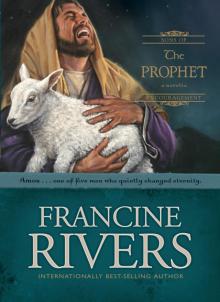 The Prophet: Amos
The Prophet: Amos As Sure as the Dawn
As Sure as the Dawn Her Daughter's Dream
Her Daughter's Dream A Voice in the Wind
A Voice in the Wind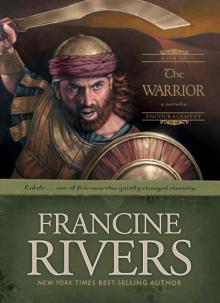 The Warrior: Caleb
The Warrior: Caleb The Scribe: Silas
The Scribe: Silas And the Shofar Blew
And the Shofar Blew The Atonement Child
The Atonement Child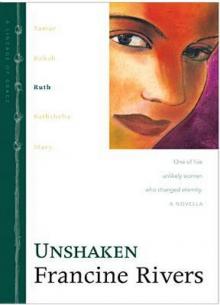 Unshaken_Ruth
Unshaken_Ruth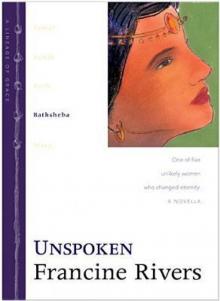 Unspoken_Bathsheba
Unspoken_Bathsheba The Scribe
The Scribe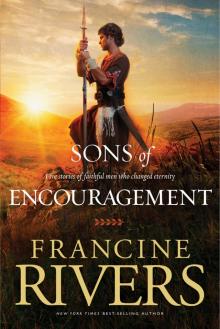 Sons of Encouragement
Sons of Encouragement The Shoe Box
The Shoe Box Sycamore Hill
Sycamore Hill Unafraid_Mary
Unafraid_Mary Marta's Legacy Collection
Marta's Legacy Collection